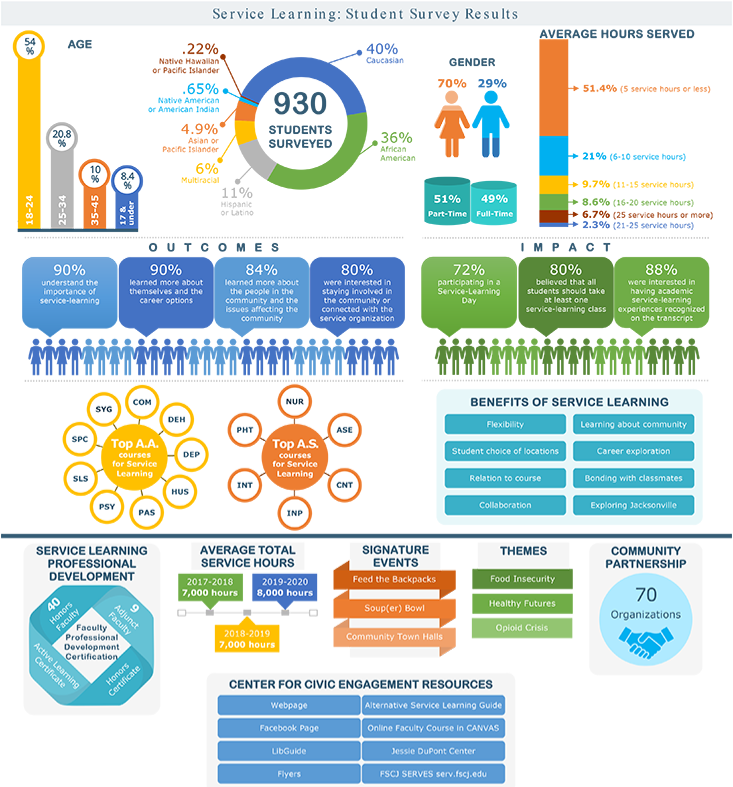
FSCJ’s Center for Civic Engagement works to foster service-learning and civic engagement efforts more deeply and consistently across the College. Civic engagement is a broad category that includes service-learning and refers to individual and collective actions that address issues of public concern. This work is accomplished by:
- Helping faculty members integrate and utilize service-learning as a teaching and learning strategy for achieving student success
- Supporting students so they have opportunities to succeed academically, professionally and civically and
- Fostering collaboration with community partners by facilitating, supporting and promoting activities that address social needs and issues
Mission
The Center for Civic Engagement will be a catalyst for developing partnerships that have a mutually transformative impact on students, faculty, staff and the communities they serve.
Vision
The Center for Civic Engagement exists to enhance learning and foster citizenship through active involvement in academically-based service.
Core Values
The Center for Civic Engagement espouses the College’s values of integrity, excellence in teaching and learning, culture of honesty and trust, creativity and respect for diversity.
Service-Learning and Civic Engagement Overview
Considered a high-impact educational practice by the American Association of Colleges and Universities, service-learning is a teaching and learning strategy that integrates meaningful community service with academic goals and critical reflection to enrich the student learning experience and teach civic responsibility. Service-learning occurs within College courses led by faculty and differs from traditional community service, which typically occurs outside a classroom context.
Academic Service-Learning vs. Volunteering
Service-learning is a form of experiential education that links service in the community with an academic course or program. It is supervised by faculty and tied to the classroom curriculum and therefore, distinct from co-curricular volunteerism. Studies show that service-learning has a positive impact on academic and civic outcomes, such as a sense of social responsibility, development of a social justice orientation, commitment to a service-oriented career, gains in moral reasoning and greater tolerance of difference. These positive outcomes apply to all students.
Benefits
There are many benefits to providing service-learning and civic engagement opportunities, such as:
- Engaging course material that helps students gain skills and develop in the areas of critical thinking, communication, teamwork and civic responsibility
- Infusing new energy into course work to create more dynamic, interactive teaching and learning experiences for both faculty and students
- Building stronger relationships between FSCJ and the local community to create a pipeline of future volunteers, employees and donors that meet local needs
Learn more about the College and community partnership for service-learning.
Service-Learning by The Numbers
Contact Information
For general questions, email or call (904) 632-3089.
Staff
Dr. Jametoria Burton, Associate Director of Program Development
Focus Areas: Curriculum and Instruction, Academic Service-Learning, Work-Based Learning, Faculty Collaborations, Community Partnerships and Grant-Funded Opportunities
(904) 537-7976
Dr. Susan Mythen, Interim Associate Provost, Curriculum and Instruction
(904) 381-3626
Accessibility Information
Alternative accessible formats of this document can be obtained upon request by contacting Dr. Jametoria Burton at (904) 632-3089.

